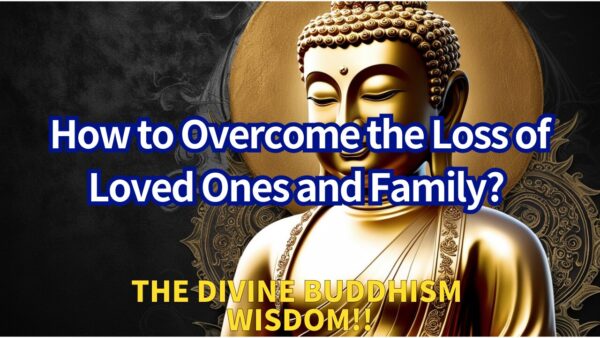
Title: How to Overcome the Loss of Loved Ones and Family | Buddhist Teachings
Introduction: The Pain of Parting with Loved Ones
In life, we all face moments of parting from loved ones or dear family members. The pain of such losses is immeasurable, gripping our hearts and plunging us into deep sorrow. However, Buddhism teaches that even this sorrow is part of life and offers us opportunities to grow. Today, we will explore how Buddhist teachings can help us face and overcome the grief of losing someone dear.
Chapter 1: The Emotions Brought by Loss
Loss often brings feelings of sadness, despair, and even anger. Why do we suffer from such intense emotions? According to Buddhist teachings, the cause often lies in what is called “attachment.” Attachment refers to the desire to control circumstances or the fear of losing what we cherish. This attachment intensifies the pain we feel in moments of loss.
For instance, when someone we love is suddenly gone, the emptiness left behind reflects the dependence our hearts had on that person. But Buddhism teaches that releasing attachment is the key to liberation.
Chapter 2: Understanding “Impermanence” in Buddhism
One of Buddhism’s fundamental teachings is the concept of “impermanence.” Everything in this world is constantly changing, and nothing remains in the same form forever. The separation from loved ones is part of this impermanence—an unavoidable aspect of nature’s cycle.
Understanding impermanence allows us to shift our perspective on loss. It prepares our hearts not to reject sadness but to accept it as a natural part of life.
Chapter 3: Knowing the Difference Between Love and Attachment
In Buddhism, “love” and “attachment” are seen as distinct concepts. Love is a state of mind where we genuinely wish for the happiness of others and respect their freedom. Attachment, on the other hand, arises from personal desires or fears and binds us to the object of our affection.
For example, when a beloved family member becomes ill, wishing for their happiness comes from love, but being consumed by the fear of losing them comes from attachment. Recognizing this difference is the first step to overcoming the pain of loss.
Chapter 4: Finding Peace Amid Loss
In the midst of loss, we can focus on “this present moment” within the depths of our grief. Buddhism emphasizes letting go of past and future concerns and concentrating on the here and now through mindfulness.
How we cherish the time spent with loved ones while they are still here, and how we remain present during moments of parting, are key to accepting separation with grace.
Chapter 5: Practical Buddhist Teachings
- Focus on Your Breathing
When overwhelmed by sorrow, take deep breaths to calm your mind. Concentrating on your breath helps you step away from emotional turmoil and regain a sense of peace. - Practice Loving-Kindness Meditation
Meditate on wishing happiness for the person you are parting with, and extend compassion to yourself. This practice nurtures feelings of respect for their freedom and their happiness. - Cultivate Gratitude
Being grateful for the time spent together helps build resilience in the face of loss. Even within grief, finding gratitude can expand the peace within your heart.
Chapter 6: Lessons Learned from Loss
Loss teaches us the importance of human connections and provides opportunities for self-reflection. In the sorrow of losing a loved one, we can gain time to deeply consider our own way of living and values.
In Buddhism, separation is not seen as an end but as a beginning. Even after a loved one is gone, their memory and lessons remain alive in our hearts.
Conclusion: The Strength to Move Forward Beyond Loss
Parting from loved ones is an inevitable part of life. Yet, by listening to Buddhist teachings, we can find the strength to overcome such grief. By understanding impermanence, learning the difference between love and attachment, and cherishing the present moment, we can gradually ease the pain of separation and discover a new path forward.
We hope the Buddhist teachings shared today will serve as a source of support for your heart and help you face the loss of loved ones with strength. Thank you!